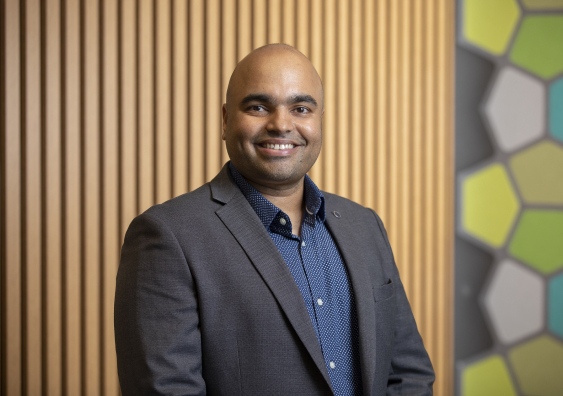UNSW researcher receives inaugural Breakthrough Fellowship for leukaemia research
The $1 million grant will support research to move beyond standard chemotherapy toward more effective and targeted treatments for leukaemia.
The $1 million grant will support research to move beyond standard chemotherapy toward more effective and targeted treatments for leukaemia.

Maddie Massy
UNSW Medicine & Health
+61 2 9348 1936
m.massywestropp@unsw.edu.au
Dr Ashwin Unnikrishnan from UNSW Medicine & Health has been awarded an inaugural Leukaemia Foundation Breakthrough Fellowship.
The Breakthrough Fellowship, a flagship funding initiative launched in 2023 by the Leukaemia Foundation, recognises emerging leaders in Australian blood cancer research. These researchers are recognised by their peers as already making significant contributions to our understanding and treatment of the disease. They will receive $1 million over five years to support the next steps in their careers and further increase their impact.
“The Breakthrough Fellowship supports the next generation of blood cancer researchers in Australia and helps them to build bold, internationally leading, research programs that could potentially transform treatments for blood cancers,” says Dr Unnikrishnan, who is one of two inaugural recipients this year.
Dr Unnikrishnan is the Head of the Molecular Mechanisms of Leukaemia laboratory, leading research to understand what drives the growth of blood cancers and their resistance to therapy. The lab is particularly focused on improving treatment of acute myeloid leukemia (AML), which is one of the deadliest types of blood cancer.
The five years of sustained funding from the Leukaemia Foundation, with support from Tour de Cure, will be crucial to develop innovative new treatment avenues for AML. Many other grants in Australia are shorter with a duration of two or three years.
“The length of the Breakthrough Fellowship is important… Science in general isn’t done in a year or two, but especially the not the cutting-edge, breakthrough science,” Dr Unnikrishnan says.
“We’re using techniques in the lab that in some instances have never been utilised in leukaemia research. And on the computational side, we’re having to develop new ways of looking at the data.”
According to Dr Unnikrishnan, new treatment approaches beyond standard chemotherapy are urgently needed for patients with AML.
“Chemotherapy is like a sledgehammer or blunt-edged tool that hits healthy and cancerous cells alike without discrimination. That’s what creates all of the side effects that come from chemotherapy,” Dr Unnikrishnan says.
However, an even bigger problem is that chemotherapy is often ineffective for AML. Relapse after treatment is very common, with the cancer returning aggressively.
Dr Unnikrishnan’s lab is particularly interested in a process inside cells called RNA splicing. This process allows single genes to be expressed in different ways and can become abnormal in cancer cells. The researchers have seen that for patients with AML, abnormal RNA splicing can lead to resistance to chemotherapy and a poorer chance of survival.
By targeting the RNA splicing process, it could be possible to reverse resistance to chemotherapy and make the treatment more effective.
“We’ve also started to see that RNA splicing happens in many other cancers and has links to chemotherapy resistance. What we discover supported by the Breakthrough Fellowship may have ramifications beyond leukaemia, across multiple types of cancers,” Dr Unnikrishnan says.
“That’s the hope.”